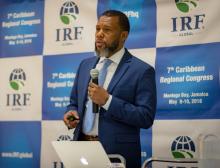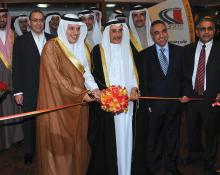The wealth of experiences and ideas shared during the recent 4th IRF Caribbean Regional Congress underscored the International Road Federation’s value in shaping policy contributions to global transportation challenges ranging from resilient infrastructure to road safety.
The regional congress coincided with the start of the 3rd United Nations Global Road Safety Week, an initiative aimed at fostering discussion and awareness-raising in more than 100 countries. The event was run by the IRF Washington office
The IRF is uniting road stakeholders across the Caribbean
The wealth of experiences and ideas shared during the recent 4th IRF Caribbean Regional Congress underscored the International Road Federation’s value in shaping policy contributions to global transportation challenges ranging from resilient infrastructure to road safety.
The regional congress coincided with the start of the 3rd3262 United Nations Global Road Safety Week, an initiative aimed at fostering discussion and awareness-raising in more than 100 countries. The event was run by the 3918 IRF Washington office.
“The timing of the IRF Congress has special significance for us, as we are reminded of the need today to strive to create safe and smart infrastructure, ramp up public awareness, and promulgate road safety legislation in Jamaica,” noted Minister Morais Guy in his opening address. “As a Government we are resolute in lowering the fatalities on our roads, and we will be playing our part in fulfilling the mission of the IRF to encourage and promote safer road networks.”
According to3263 World Health Organisation statistics, many nations in the region experience road traffic deaths at a rate well above 50/100,000 vehicles — a number seven times higher than countries that have embraced the “safe system” approach and translated it into sophisticated road safety programs.
“We need the right signage, the right infrastructure and the right maintenance,”4180 National Transportation Safety Board representative Nicholas Worrell noted, “but we also must change unsafe driver behaviour to reduce roadway deaths and injuries. In many ways our efforts depend on changing people’s hearts and minds about road safety culture.”
Speaking for the United Nations Environmental Program, Liana Vetch drew attention to the plight of non-motorised traffic, who collectively account for 27% of road traffic deaths. Many countries have yet to adopt specific policies and instruments aimed at ensuring roads can be safely shared by all users, she noted.
Rising road deaths are not an inevitable by-product of growing mobility in the region.4833 Caribbean Development Bank representative Glen McCarvell pointed out encouraging progress on Belize’s roads via a program supported by an innovative CDB project to strengthen the country’s road safety management capacity, enhance the safety of its road infrastructure and improve post-crash care.
IRF president & CEO C Patrick Sankey remarked, “The abundance of ideas and experiences shared during the Congress once again underscores the irreplaceable role of the IRF in promoting an agenda of shared prosperity that flows from accessible, affordable and safe road networks. As the international community prepares for major summits on safety and climate change in November 2015, this Congress was a unique opportunity to shape the region’s contribution.”
The wealth of experiences and ideas shared during the recent 4th IRF Caribbean Regional Congress underscored the International Road Federation’s value in shaping policy contributions to global transportation challenges ranging from resilient infrastructure to road safety.
The regional congress coincided with the start of the 3rd
“The timing of the IRF Congress has special significance for us, as we are reminded of the need today to strive to create safe and smart infrastructure, ramp up public awareness, and promulgate road safety legislation in Jamaica,” noted Minister Morais Guy in his opening address. “As a Government we are resolute in lowering the fatalities on our roads, and we will be playing our part in fulfilling the mission of the IRF to encourage and promote safer road networks.”
According to
“We need the right signage, the right infrastructure and the right maintenance,”
Speaking for the United Nations Environmental Program, Liana Vetch drew attention to the plight of non-motorised traffic, who collectively account for 27% of road traffic deaths. Many countries have yet to adopt specific policies and instruments aimed at ensuring roads can be safely shared by all users, she noted.
Rising road deaths are not an inevitable by-product of growing mobility in the region.
IRF president & CEO C Patrick Sankey remarked, “The abundance of ideas and experiences shared during the Congress once again underscores the irreplaceable role of the IRF in promoting an agenda of shared prosperity that flows from accessible, affordable and safe road networks. As the international community prepares for major summits on safety and climate change in November 2015, this Congress was a unique opportunity to shape the region’s contribution.”








